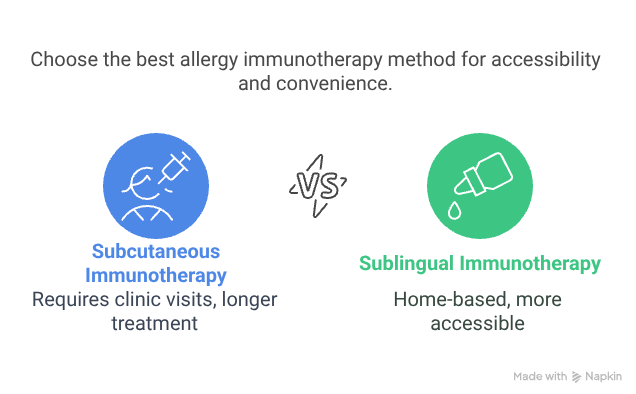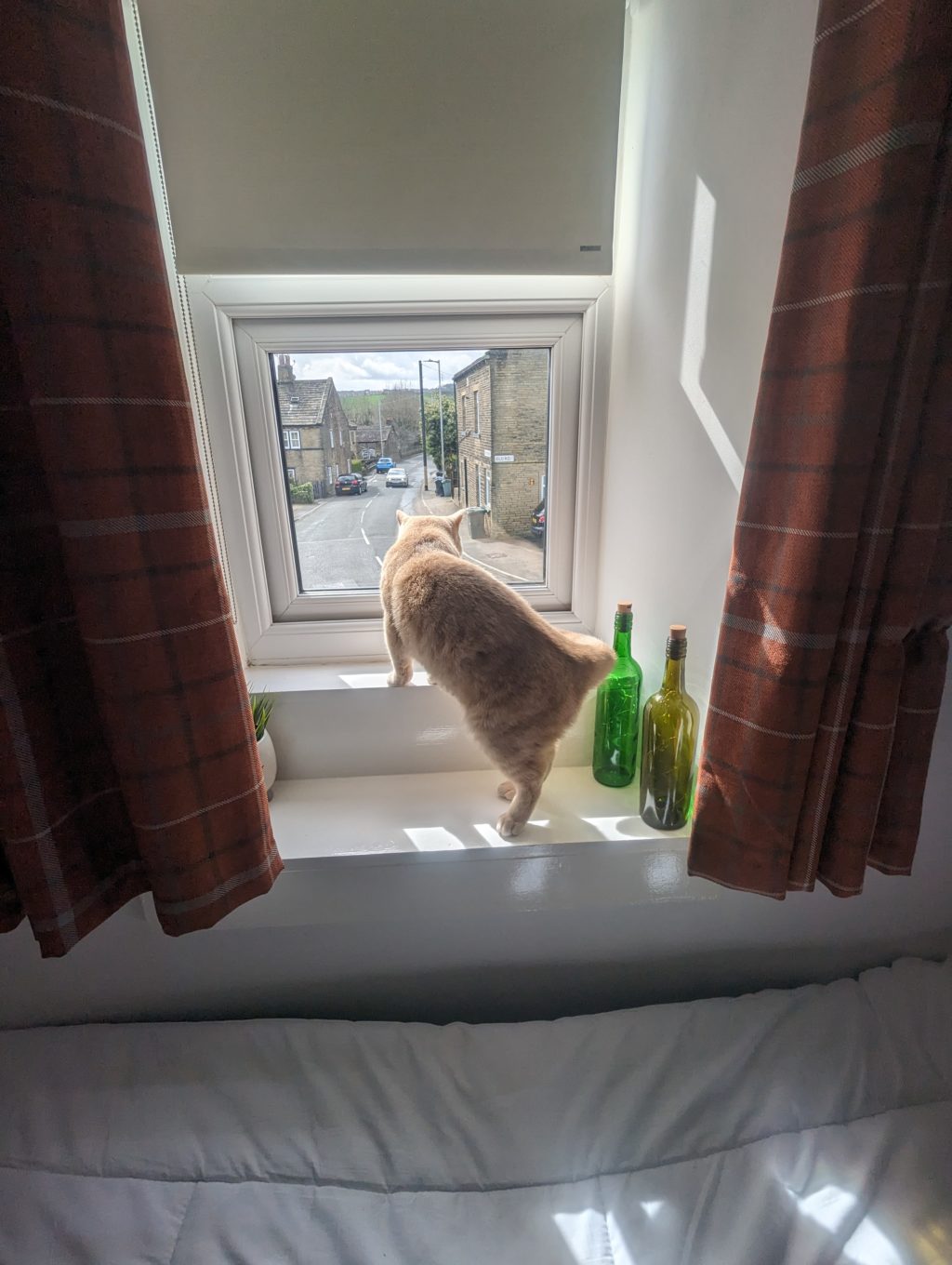Breaking Barriers: How Cat Allergy Immunotherapy Supports Disabled People to Live More Freely
| Key Takeaways |
|---|
| Cat allergies can seriously affect the independence and well-being of disabled people. |
| Allergy immunotherapy (AIT) is a long-term treatment that can reduce or even stop allergic reactions to cats. |
| There are two main types of AIT: allergy shots (SCIT) and sublingual tablets or drops (SLIT). |
| SLIT is more accessible for people with limited mobility as it’s taken at home. |
| While costs vary, the long-term benefits to health and independence often outweigh the initial expense. |
The Human Impact of Cat Allergies
For many disabled people, a cat brings emotional support, routine, and companionship. Allergic reactions can quickly turn that relationship into a health challenge. Symptoms like sneezing, itchy eyes, and breathing problems can make everyday life harder.
Managing cat allergies is important for physical health and independence. Symptoms can affect sleep, movement, and the ability to manage a home safely. For some, allergic reactions can even mean avoiding certain environments or giving up a beloved pet.
Thanks to advances in allergy treatment, especially immunotherapy, there’s a path forward. Cat allergy immunotherapy is helping people manage symptoms more effectively, stay connected to the animals they love, and live more freely.
Understanding Cat Allergies
Cat allergies are caused by proteins found in a cat’s saliva, skin (dander), and urine. These proteins cling to fur and become airborne, sticking to surfaces like furniture, carpets, and clothes. For some people, even a short visit to a home with cats can lead to a reaction.
Common allergic reactions include:
- Sneezing, nasal congestion, or a runny nose
- Itchy, watery eyes
- Skin rashes or hives
- Wheezing or difficulty breathing (especially for those with asthma)
For disabled people, especially those with respiratory challenges or immune sensitivities, these symptoms can interfere with mobility, sleep, mental health, and even personal care routines.
What is Allergy Immunotherapy?
Allergy immunotherapy is a long-term treatment that retrains the immune system to be less sensitive to specific allergens. It works by introducing very small amounts of the allergen into the body, gradually increasing the dose until the immune response calms down.
There are two main types:

- Subcutaneous Immunotherapy (SCIT): Also known as allergy shots, this treatment is administered in a healthcare setting over several months to years.
- Sublingual Immunotherapy (SLIT): This treatment uses drops or tablets placed under the tongue. After the first dose is taken in a clinic, the rest are usually taken at home, making this a more accessible option for many.
According to the Cleveland Clinic, about 80% of people experience significant improvement in their symptoms with immunotherapy. While the transformation doesn’t happen overnight, the time and effort required are well worth the result for many people.
Benefits of AIT for People with Disabilities
Living with a disability can already present barriers, but cat allergies shouldn’t be one of them. Here’s how immunotherapy can help:
- Better Sleep and Energy: With fewer allergic reactions, individuals often sleep better, have more energy, and enjoy greater comfort.
- Increased Independence: Managing allergies effectively may reduce the need for carers to help with air purifiers, medications, or allergy-proofing your space.
- Emotional Wellbeing: Cats provide companionship and emotional support. Immunotherapy may allow individuals with disabilities to keep their pets without the health trade-offs.
So, in a nutshell, managing cat allergies can mean less stress, more freedom, and uninterrupted time with a beloved companion.
Budgeting for the Costs of AIT
In the USA:
While allergy immunotherapy can be a highly effective and worthwhile treatment, it does come with a financial commitment. On average, people pay between $1,000 and $4,000 per year for allergy shots, although this can vary depending on treatment length, frequency, and insurance coverage.
If you go with sublingual allergy immunotherapy, your insurance may not cover it, leaving you to pay for the treatment in its entirety. However, this option tends to be more affordable than allergy shots, making it a great option for those with tight budgets.
To better understand allergy immunotherapy costs, it’s important to explore what your healthcare plan includes, whether you qualify for any assistance programs, and how different treatment options compare.
While the upfront cost can seem high, many people find that fewer medications, fewer sick days, and fewer flare-ups bring value that outweighs the investment over time.
Paying for Allergy Treatment in the UK
Allergy treatment can help you feel better and live more freely with your cat. But it’s important to know what it might cost and what support is available.
Is it free on the NHS?
- Some types of allergy immunotherapy (like allergy shots) may be available on the NHS, but not everywhere.
- You usually need to see a specialist (like an allergist) to be offered this treatment. Your GP will need to refer you.
- Waiting times can be long, and it may not be offered in every part of the country.
Paying privately
If NHS treatment isn’t available or you want to start sooner, you can pay for private treatment. This can include:
- Allergy shots given in a clinic
- Sublingual tablets or drops you take at home
Private treatment can cost hundreds or even thousands of pounds a year, depending on:
- Where you go
- How often you need the treatment
- How long you need to take it
Sublingual treatments are often cheaper and easier for people with limited mobility because they don’t require clinic visits.
Help with costs
Here are some things that might help with money:
- Health insurance (if you have it) may cover some of the costs
- Some pharmacies offer private allergy testing at lower prices
- You may be able to spread the cost monthly at private clinics
- Ask if there are low-income discounts or financial support schemes
Is it worth the money?
For many people, yes. Spending money on allergy treatment may:
- Reduce the need for other medicines
- Help you miss fewer days from work
- Make it easier to care for yourself and your pet
Always speak to your GP first. They can help you find out if NHS care is available, and what the next steps might be.
What to Expect and How to Get Started
If you’re considering immunotherapy, start by speaking with your primary care provider (PCP) or allergist. They can perform allergy testing to confirm your triggers and recommend the best form of treatment.
Here’s what to keep in mind:
- Treatment typically lasts 3-5 years, and consistency is key.
- Side effects may include mild swelling or itching. Serious reactions are rare, especially with sublingual therapy taken at home, but must be discussed with a provider.
- SLIT may be a better fit for those with limited mobility, since it requires fewer clinic visits.
Helpful Products for UK Readers Managing Cat Allergies
If you’re in the UK and exploring ways to manage cat allergy symptoms alongside immunotherapy, a few affordable products can help. Here are some ideas that can help you track your triggers, ease facial swelling, or create a calmer sleep environment.
The links below are ‘affiliate links’ and we obtain a small commission on purchases to help support our site if you buy through them. This is at no extra cost you and you benefit from the discounts offered.
1. Confirm Triggers from Home
Understanding your allergies is the first step towards managing them. Try a YorkTest home allergy test for a comprehensive check of common allergens, including pet dander.
2. Soothe Swelling and Puffiness
Gentle skincare can help reduce irritation and swelling caused by allergies. Try Cult Beauty’s Cult Conscious range for 20% off selected allergy-conscious skincare and beauty products.
3. Upgrade Your Sleep Environment
Good sleep is vital when managing allergies. Consider hypoallergenic bedding and sleepwear from MUJI UK
– get £10 off orders over £50 or £20 off orders over £100 to help create a cleaner, more comfortable bedroom.
4. Support Your Immune System
Vitamins and supplements can help your body handle allergy season. Bears with Benefits
offers 10% off for new customers (minimum spend £20) on a range of gummies and supplements.
5. Air Purifiers & Cleaner Air
Improving air quality at home can help reduce allergy symptoms. Save 10% on all air filters and purifiers at FactoryDirectFilters
(use code CLEANAIR10 at checkout).
A Better Way to Live With Your Cat
Cat allergies can make life harder. But you don’t have to give up the things that matter to you—like your pet.
There is help available. Cat allergy treatment can lower your symptoms and make it easier to breathe, sleep, and take care of yourself.
If you were told to give up your cat, or never got one because of allergies, you can now think again. Speak to your doctor. Ask if allergy treatment is safe for you.
With the right help, you could have fewer sneezes—and more cuddles.

